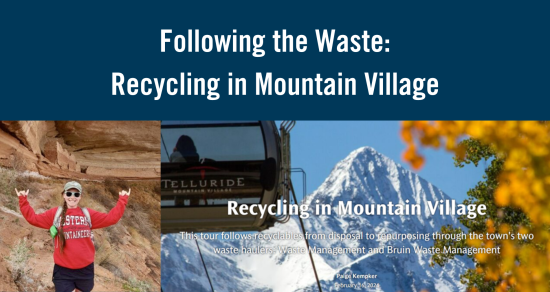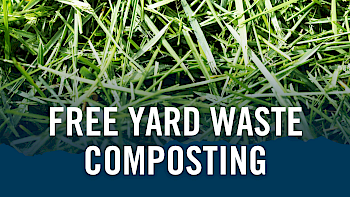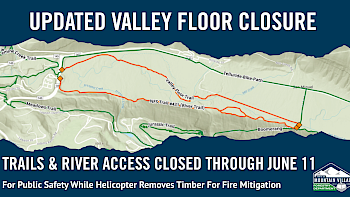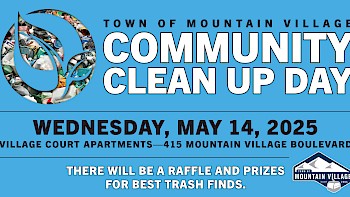
Following the Waste: Recycling in Mountain Village
The Town of Mountain Village has partnered with Western Colorado University’s (WCU) Clark School of Environment and Sustainability to help understand the community's waste stream. According to the 2020 Mountain Village Climate Action Plan, the waste sector makes up about 7% of Mountain Village’s community greenhouse gas emissions.
Paige Kempker, a WCU Master in Environmental Management graduate student, has been working with the Town to launch a waste reduction and education campaign. Her project centers on identifying barriers to recycling in Mountain Village, educating key actors in recycling operations, assessing recent recycling trends, and quantifying current greenhouse gas emissions for the Town’s waste sector.
This project began in October 2023 when Paige spent two weeks in Mountain Village conducting a commercial recycling audit on hotels, retail locations, and homeowner’s associations in the Village Center. Here, she collected first-hand accounts of recycling barriers at each location. The opinions of the business owners varied slightly depending on the circumstances. Still, nearly every location mentioned tourists’ “vacation brain” and a lack of understanding about waste hauling practices as obstacles to reducing waste in Mountain Village.
“Vacation brain” is a state of mind during vacation when one is not actively thinking about one's actions and their environmental impacts. How can we expect visitors to recycle when the Town’s residents feel there’s a lack of understanding of what truly happens to their recyclables? These and several other barriers are addressed throughout Paige’s project.
In an effort to further understand the life cycle of our recyclable materials from the waste haulers, Paige and J.D. Wise, Mountain Village’s Economic Development and Sustainability Director, visited Waste Management and Bruin Waste Management’s materials recovery facilities (MRFs) in Grand Junction and Montrose. They toured each facility, walked through the recycling operations, and relayed commonly asked questions regarding contamination, recycling markets, and landfilling. These tours and questions are summarized in a geographic information system (GIS) StoryMap as the first element in Paige’s educational campaign. In the coming months, Paige will create other educational materials to help increase understanding and improve recycling.
A few key findings include:
- Bruin Waste and Waste Management do not take collected recyclables to the landfill.
- Contamination typically does not ruin the whole recycling bin.
- Contamination rates are between 3% and 11% in Mountain Village, compared to the national average of 25%.
- Although recycling is required in Mountain Village, the residential recycling rate is 33% and the commercial recycling rate is only 10%.
The final part of Paige’s project includes an assessment of recent waste trends and a greenhouse gas inventory of Mountain Village’s waste sector from 2020 to the present. The year 2020 was chosen due to the impacts of the COVID-19 pandemic. Additionally, using a Life Cycle Assessment, Paige will compare greenhouse gas emissions from both Waste Management and Bruin Waste Management before and after 2020 to inform future recycling operations.
This portion of Paige’s master’s project will help support recycling in Mountain Village in the context of climate action. The Town looks forward to sharing the results in 2024!


